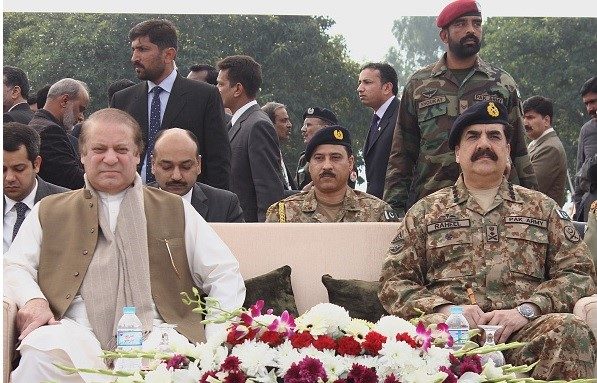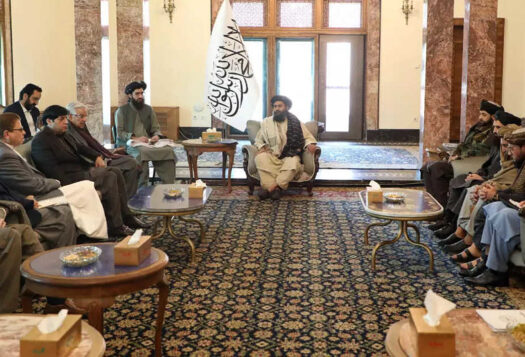
Last week, Pakistan’s oldest and most esteemed English newspaper ran a dramatic story, written by their star columnist Cyril Almeida, headlined: “Act against militants or face international isolation, civilians tell military.” The piece claimed that, in recent undisclosed meetings, the civilian government had put pressure on the military to take indiscriminate action against militant leaders and groups such as Masood Azhar and the Jaish-e-Mohammad; Hafiz Saeed and the Lashkar-e-Taiba; and the Haqqani network in Afghanistan.
Since then, Almeida’s piece has triggered a wave of controversy, leading to the government adding his name to the “Exit Control List” (ECL), essentially banning him from leaving the country. This came after the Prime Minister’s office released a statement in response to the article, claiming that any allegations of a rift between the establishment and the civilian-led government were nothing but an “amalgamation of fiction and fabrication.”
Though Almeida’s name has now been taken off the ECL list, many in Pakistan believe that the government’s ultra-defensive tone and their overtly hostile actions towards him may have already revealed enough to verify the facts of Almeida’s investigative story.
This confrontation has once again brought to the forefront Prime Minister Nawaz Sharif’s dangerous and unstable rapport with the army. It’s no secret that there’s been no love lost between the Sharifs and the ever-looming security establishment, yet this recent tussle reveals deep rifts in the relationship at a crucial time.
With regard to Pakistan Muslim League-Nawaz (PML(N)), this revelation only gives substance to public perceptions of their apparent enmity towards the enormously popular retiring army chief Gen. Raheel Sharif. Many see PML (N)’s unwarranted sanctions against Almeida as a bid to distract from the ongoing power struggle. The Prime Minister will soon be tasked with appointing a new chief, and any animosity now will put the general public on high alert for any duplicity in this crucial decision.

For the military, the repercussions of this alleged fallout are even worse. At a time when tensions between India and Pakistan are at a high and Washington is increasingly insistent that Pakistan act against home-grown militant groups, these reports reinforce the narrative that the Pakistan Army has long sponsored certain jihadi groups for leverage in the region.
Beyond diplomatic appearances and political moves, perhaps the most uneasy aspect of this entire situation has been its implications for press freedom in Pakistan. This isn’t the first time that the media in Pakistan has come under fire for divulging the alleged inner workings of state institutions. Two years ago, prominent broadcast journalist Hamid Mir led a fiery campaign against the ISI, accusing the organization of providing support to the Afghan Taliban and supplying the United States with drone-strike targets. Soon, Mir found himself standing in opposition to the army, its hordes of supporters, and rival media groups, quickly becoming the target of a storm of negative public opinion. Mir was shot and wounded by unidentified gunmen in April 2014, an action for which he alleged the ISI was responsible.
Another prominent example is that of The New York Times Islamabad bureau chief Declan Walsh, who wrote extensively about the suffering of the Baloch people at the hands of the government. Days before the May 2013 election, Walsh was served a notice by authorities to leave the country within 72 hours due to his “undesirable activities.” Various other journalists in Pakistan have reported intimidation, censorship, and use of force at the hands of police, intelligence agencies, and the government.
This most recent attack on press freedom in Pakistan, with the scapegoating of Cyril Almeida, has once again sent a clear, uncompromising message to the media in Pakistan: stay in line. However, sticking to its guns, Dawn released a statement asserting that “journalism has a long and glorious tradition of keeping its promise to its audience even in the face of enormous pressure brought to bear upon it from the corridors of power” and that it would continue to resist “the state’s narrow, self-serving and ever-shifting definition of ‘national interest.’”
In times when journalism is largely inspired by revolutionary, Wikileaks-style methods of sharing information, do Pakistan’s powerhouses genuinely believe that the truth can be suppressed by imposing travel bans on journalists? Sharif is now playing a dangerous game, juggling the media and military in attempts to placate both. Yet public memory is short-lived, and even if this strategy appears to work in his favor for now, the security establishment is watching. Unfortunately for Sharif, the military is not one to forgive and forget.
Editor’s Note: To read this article in Urdu, please click here.
***
Image 1: Jon S, Flickr
Image 2: Rana Sajid Hussain/Pacific Press/LightRocket, Getty Images


